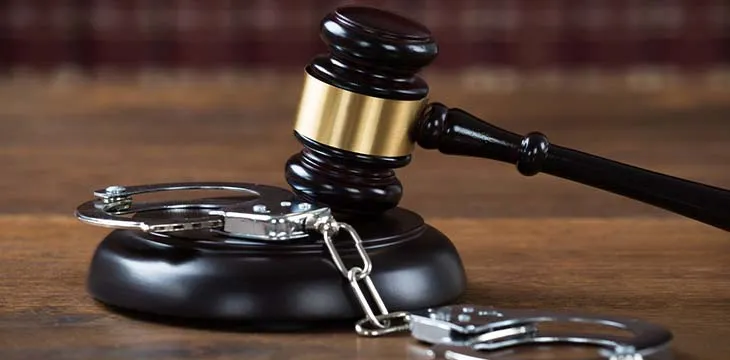|
Getting your Trinity Audio player ready...
|
Sam Bankman-Fried, the founder of the FTX exchange, has been arrested by Bahamian authorities after the U.S. Department of Justice (DOJ) filed criminal charges against crypto’s disgraced boy-king.
Damian Williams, U.S. Attorney for the Southern District of New York—the primary avenue for prosecuting financial criminals—announced SBF’s arrest on Twitter, saying Bahamian authorities had acted at the U.S. government’s request. Williams added that an indictment would likely be unsealed Tuesday morning, after which he’d have “more to say.”
The New York Times reported that SBF was facing charges including wire fraud, wire fraud conspiracy, securities fraud, securities fraud conspiracy, and money laundering. Bahamas Attorney General Ryan Pinder stated the obvious Monday night by saying the U.S. was “likely to request [SBF’s] extradition” and that the Bahamas would process such a request “promptly.”
The U.S. Securities and Exchange Commission (SEC) is preparing its own charges against SBF. Enforcement Division director Gurbir Grewal tweeted that details regarding SBF’s “violations of securities laws” would be filed Tuesday.
Gurbir Grewal: We commend our law enforcement partners for securing the arrest of Sam Bankman-Fried on federal criminal charges. The SEC has authorized separate charges relating to his violations of securities laws, to be filed publicly tomorrow in SDNY. https://t.co/ON0LgY4mf4
— U.S. Securities and Exchange Commission (@SECGov) December 13, 2022
Bahamian Prime Minister Philip Davis issued a statement saying his country and the U.S. “have a shared interest in holding accountable all individuals associated with FTX who may have betrayed the public trust and broken the law.” Davis added that local authorities will continue to conduct their own “regulatory and criminal investigations into the collapse of FTX.”
Grossly inexperienced and unsophisticated
SBF was scheduled to testify remotely before the U.S. House of Representatives Financial Services Committee on Tuesday morning, but that now appears unlikely. SBF previously turned down a request to appear at a similar Senate hearing on Wednesday, which didn’t exactly earn him any more friends in D.C.
Statement from Maxine Waters regarding SBF. pic.twitter.com/ThUu8oGkcz
— Autism Capital 🧩 (@AutismCapital) December 13, 2022
FTX’s current CEO, John J. Ray III, who was appointed following FTX’s November 11 bankruptcy filing, will appear at Tuesday’s hearing. Ray will testify that the collapse of FTX, its affiliated market-maker Alameda Research, and roughly 130 other associated entities was due to this cabal being run by “a very small group of grossly inexperienced and unsophisticated individuals.”
That inexperience and unsophistication led Alameda’s co-CEOs, Caroline Ellison and Sam Trabucco, to make some ill-advised margin trades with FTX customer funds that didn’t pay off. To plug the resulting hole in Alameda’s balance sheet, SBF et al. papered it over with FTX’s worthless in-house FTT token.
When word of this fiscal imbalance leaked, FTX customers flooded the site with withdrawal requests. Changpeng ‘CZ’ Zhao, founder of the Binance exchange and an early FTX investor, then publicly threatened to dump the half-billion or so worth of FTT he received when FTX bought out his stake last year. The fire at FTX quickly became a firestorm, and the whole enchilada collapsed within a matter of days.
In Ray’s prepared remarks, he also reveals that FTX “went on a spending binge in late 2021 through 2022, during which approximately $5 billion was spent buying a myriad of businesses and investments, many of which may be worth only a fraction of what was paid for them.” FTX insiders also received over $1 billion in “loans and other payments.”
The circular firing squad takes aim
SBF took part in a Twitter Spaces event earlier Monday, part of his ongoing press tour that defies legal norms (and common sense). Ironically, the event saw SBF claim that he didn’t think it likely that he would be arrested.
Numerous members of ‘crypto Twitter’ had resorted to wild conspiracy theories to explain why SBF was able to continue his ill-advised media blitz without someone slapping the cuffs on him. The reality was far more mundane: law enforcement often moves at a glacial pace because, unlike a 280-character Nostradamus, they need to ensure their legal ducks are in a row before they act.
While SBF never left the Bahamas, Caroline Ellison’s whereabouts were a mystery until she was spotted at a New York City coffee shop last week. Bloomberg then reported that Ellison had hired Wilmer Hale partner Stephanie Avakian—a former SEC enforcement division chief—as her legal representative.
Caroline Ellison is about to flip on Sam Bankman-Friedhttps://t.co/yMZtQxIuai
— CoinGeek (@RealCoinGeek) December 6, 2022
Speculation has since run rampant that Ellison was preparing to testify against her former partners-in-crime/ineptitude in exchange for more lenient treatment. Given the lengthy sentences courts can dole out to those who violate the U.S. Racketeer Influenced and Corrupt Organizations (RICO) Act—as SBF and his merry band of thieves have undoubtedly done—Ellison is a motivated talker.
Similar fears are likely gripping Binance’s CZ and the individuals behind the Tether stablecoin. FTX/Alameda was among the largest recipients (~$40 billion) of Tether, but the collapse of SBF’s empire has raised real questions about whether he ever had sufficient cash to buy such a huge volume of Tether tokens.
Tether likes to claim that it only sells Tether for U.S. dollars and invests those dollars in trustworthy vehicles like U.S. T-bills (even though no one on Wall Street has ever heard of Tether). But the company’s most recent attestations of its reserves—despite five years of promises, Tether has never submitted to a formal third-party audit—show billions in ‘secured loans,’ the math for which doesn’t really add up.
If anyone knows the true goings-on at Tether, it’s SBF. The feds may take a particular interest in the recent news that Alameda and the chairman of Deltec Bank & Trust—the Bahamas banker of both FTX and Tether—had their fingers in a tiny nondescript bank in Washington State.
Bottom line: if SBF is being sold down the river by Ellison, SBF will have to offer the feds someone else’s neck to obtain leniency for himself. In addition to Tether, there’s the recent revelation that SBF, CZ, and other exchange bosses participated in a group chat on the Signal private messenger app dubbed ‘Exchange coordination.’ Suffice it to say, the authorities may want to know what other RICO-worthy conspiracies may have been hatched during those online chats.
As insane as this may seem, the Australian Financial Review reported Monday that SBF, Ellison, and several other FTX/Alameda alumni took part in a different Signal group chat called—wait for it—‘Wirefraud.’ SBF told the AFR that he had “never heard of such a group” and “if this is true, then I wasn’t a member of that inner circle.”
The wheels of justice may turn slowly, but you don’t want to be under them once they start rolling. CoinGeek has long warned that a new age of regulation was coming, that the freewheeling ‘crypto bros’ were playing with fire by continually thumbing their noses at the authorities, and that the authorities weren’t really in a ‘forgive and forget’ mood. Still, can’t wait for someone to leak the ‘Prison sucks’ chat messages.
Follow CoinGeek’s Crypto Crime Cartel series, which delves into the stream of groups—from BitMEX to Binance, Bitcoin.com, Blockstream, ShapeShift, Coinbase, Ripple,
Ethereum, FTX and Tether—who have co-opted the digital asset revolution and turned the industry into a minefield for naïve (and even experienced) players in the market.

 05-09-2025
05-09-2025 





